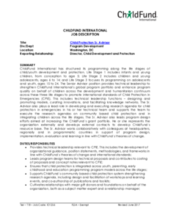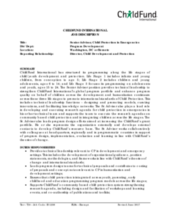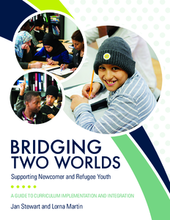Displaying 1631 - 1640 of 2510
The Senior Advisor position provides technical leadership to strengthen ChildFund International’s global program portfolio and enhance program quality on behalf of children across the development and humanitarian continuum across these three life stages to promote international standards of Child Protection in Emergencies (CPiE).
ChildFund International is seeking a Senior Advisor of Child Protection.
In this review, the authors briefly outline who is most at risk for experiencing parental incarceration, before providing an overview of recent multidisciplinary research on the impacts of parental incarceration for American children, ages 0–17.
This 5-minute video from the Center on the Developing Child at Harvard University explores the development and use of core capabilities — known as executive function and self-regulation skills — from early childhood into adolescence and adulthood.
A new resource has been developed to help Canadian educators meet the needs of immigrant and refugee youth in Canadian schools - including those who are unaccompanied or have been separated from their families - according to this article posted by Canadian non-profit, CERIC.
Bridging Two Worlds provides teachers, school administrators and counsellors in Canada with the knowledge and practical resources to deliver more informed and culturally responsive career development and guidance to newcomer and refugee youth from Kindergarten to Grade 12.
An indigenous woman in Ottawa, Canada is preparing a home birthing kit in the fear that her newborn will be taken into the Child and Family Services system if she goes into the hospital to deliver, according to this article from CTV News.
UNICEF is seeking a consultant with experience in Child Protection in Emergencies and Knowledge Management.
UNICEF is seeking a consultant with experience in Child Protection in Emergencies and Knowledge Management.
This paper presents findings from an 18-month randomized controlled trial in which intact families (N = 122) with at least one CPS report were provided with a facilitated connection to a paraprofessional evidence-based HV program or usual care services from child protection.



